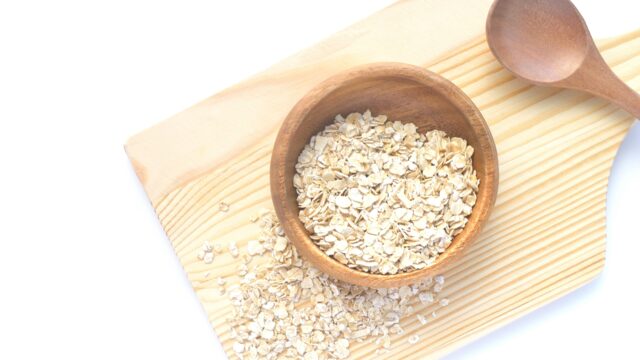認知症の予防や脳の健康維持に役立つ栄養素を取り入れるために、最新の研究とそれをサポートする食材・サプリメント情報をまとめました。
この記事では、
カズレーザーで学ぶ!で取り上げられたサプリメントや食材の他、
科学的な根拠に基づく効果的な食品と、その効果を補完するサプリメントやレシピを紹介します。
※記事内の[数字]は記事下にある論文リストの番号です。
食物とサプリメント一覧
1. ビタミンD
食物: サケ、イワシ、卵黄、強化乳製品、キノコ
サプリメント: ビタミンDサプリメント(1,000 IU – 2,000 IUが目安)
効果: ビタミンDは脳の健康維持に寄与し、認知機能の低下を予防する可能性があります。特に、高齢者におけるビタミンD不足が認知症リスクの増加と関連しています[1]。
2. オメガ3脂肪酸(DHA・EPA)
食物: サバ、サーモン、イワシ、クルミ、アマニ油
サプリメント: 高品質DHA・EPAサプリメント
効果: DHAやEPAなどのオメガ3脂肪酸は、神経保護作用を持ち、軽度認知障害の改善に有効とされています。また、アルツハイマー病のリスク低減に寄与することが示されています[2-4]。
3. カフェイン
食物: コーヒー、緑茶、紅茶、ダークチョコレート
サプリメント: カフェインサプリメント(コーヒー摂取が難しい方に)
効果: 適度なカフェイン摂取は、アルツハイマー病のリスクを軽減する可能性があります。カフェインは抗酸化作用や神経保護効果を持ち、脳の健康をサポートしま[5,6]。
4. レスベラトロール
食物: 赤ワイン、ブドウ(特に皮)、ラズベリー、ダークチョコレート
サプリメント: レスベラトロールサプリメント(500mg程度)
効果: レスベラトロールは強力な抗酸化作用を持ち、脳の健康維持に有効です。研究では、アルツハイマー病に関連するバイオマーカーの進行を抑える可能性が示唆されています[7-9]。
5. タウリン
食物: タコ、イカ、貝類、エビ
サプリメント: タウリンサプリメント(1,000mg程度)
効果: タウリンは神経保護作用を持ち、脳内の炎症を抑える効果があります。これにより、認知機能の低下を防ぎます[10]。
6. ホスファチジルセリン
食物: 大豆製品(豆腐、納豆、豆乳)、卵黄
サプリメント: ホスファチジルセリンサプリメント(100-300mg)
効果: ホスファチジルセリンは、記憶力や認知機能の改善に役立つことが研究で示されています。特に、高齢者やアルツハイマー病患者に対して効果が期待されます[11-13]。
7. クルクミン(ターメリック)
食物: ウコン、カレー粉
サプリメント: 高吸収クルクミンサプリメント(500-1,000mg)
効果: クルクミンは、抗炎症作用と抗酸化作用により脳の健康を守り、認知機能の低下を防ぐ可能性があります[14,15]。
8. ビタミンE
食物: アーモンド、ヒマワリの種、ホウレンソウなどの緑葉野菜
サプリメント: ビタミンEサプリメント(400 IU程度)
効果: ビタミンEは酸化ストレスから神経細胞を保護する効果があり、脳の老化を遅らせるとされています。ただし、高用量のビタミンE摂取は注意が必要です[16,17]。
9. エリタデニン
食物: シイタケ
サプリメント: シイタケエキスサプリメント
効果: エリタデニンは、血中コレステロールを低下させる効果があり、これが間接的に脳の健康維持に寄与する可能性があります[18,19]。
10. β-グルカン
食物: マイタケ、シイタケ、エノキタケ、大麦
サプリメント: β-グルカンサプリメント(免疫サポート目的)
効果: β-グルカンは免疫機能を強化し、抗炎症作用を持ちます。脳内の炎症を抑えることで、神経細胞を保護し認知機能の低下を予防する効果が期待されています[21,22]。
11. エルゴチオネイン
食物: シメジ、エリンギ、マッシュルーム
サプリメント: エルゴチオネインサプリメント
効果: エルゴチオネインは強力な抗酸化作用を持ち、脳の酸化ストレスから神経細胞を保護します。これにより、認知機能の低下を防ぐ可能性があります[23,24]。
12. ヒラシナン(Hericenones)
食物: ヤマブシタケ
サプリメント: 高濃度ヤマブシタケサプリメント
効果: ヒラシナンは、神経成長因子(NGF)の産生を促進し、神経細胞の成長や修復を助けます。アルツハイマー病予防にも効果が期待されています[25]。
13. エリナシン(Erinacines)
食物: ヤマブシタケ
サプリメント: 高濃度ヤマブシタケサプリメント
効果: エリナシンは、神経成長因子(NGF)の産生を促進し、神経細胞を保護・修復する効果が期待されています。動物実験では、アルツハイマー病の進行を遅らせる効果が示されています[26,27]。
認知症予防に役立つ食品を使ったレシピ
以下に、認知症予防に役立つ食品を使ったレシピをいくつか紹介します。これらのレシピは栄養価が高く、認知機能をサポートする食材がたっぷり含まれています。
1. サーモンのグリル with ターメリックスパイス

食材: サーモンフィレ、オリーブオイル、ターメリック、ガーリック、レモン、塩・コショウ
手順:
⦁ サーモンにオリーブオイルを軽く塗り、ターメリック、ガーリックパウダー、塩・コショウを振りかけます。
⦁ グリルパンでサーモンを両面2-3分ずつ焼きます。
⦁ レモンを絞り、盛り付けて完成。
2. ヤマブシタケとエリンギの味噌汁

食材: ヤマブシタケ、エリンギ、味噌、だし汁、ねぎ、豆腐(お好みで)
手順:
⦁ ヤマブシタケとエリンギを薄切りにします。
⦁ 鍋にだし汁を沸かし、きのこ類を加えて中火で煮ます。
⦁ きのこが柔らかくなったら、味噌を溶き入れます。
⦁ ねぎをトッピングし、好みで豆腐を加えたら、軽く煮立てて完成です。
効果: ヤマブシタケには神経成長因子(NGF)の産生を促進する成分が含まれており、エリンギは抗酸化作用の強いエルゴチオネインが豊富です。この味噌汁は、脳の健康をサポートし、認知症予防に役立つ成分を取り入れた栄養満点の一品です。
3. ほうれん草とアーモンドの醤油炒め

食材: ほうれん草、アーモンドスライス、にんにく、醤油、オリーブオイル、塩・コショウ
手順:
⦁ ほうれん草を洗い、水気を切ります。
⦁ フライパンにオリーブオイルを熱し、スライスしたにんにくを炒めます。
⦁ ほうれん草を加え、しんなりするまで炒めます。
⦁ アーモンドスライスを加えてさらに軽く炒め、最後に醤油で味付けし、塩・コショウで味を整えます。
効果: ビタミンEが豊富なアーモンドと、抗酸化作用の高いほうれん草を組み合わせた一品です。醤油の風味がアクセントとなり、シンプルながらも栄養価の高い炒め物です。ビタミンEは脳の酸化ストレスを軽減し、抗炎症作用も期待できます。
4. タコとエビのシーフードサラダ

食材: タコ、エビ、レモン、オリーブオイル、パセリ、塩・コショウ
手順:
⦁ タコとエビを茹でて、冷やしておきます。
⦁ ボウルにレモン汁、オリーブオイル、パセリ、塩・コショウを混ぜてドレッシングを作ります。
⦁ タコとエビにドレッシングをかけて混ぜ、冷やしてサーブします。
効果: タウリンが豊富なタコとエビを使用しており、神経細胞を保護する効果が期待できます。
5. キノコとオート麦のリゾット

食材: シイタケ、マイタケ、オート麦、玉ねぎ、チキンブロス、パルメザンチーズ、オリーブオイル
手順:
⦁ 玉ねぎをオリーブオイルで炒め、シイタケとマイタケを加えて炒めます。
⦁ オート麦を加え、チキンブロスで煮込みます。
⦁ 最後にパルメザンチーズを加えて、クリーミーなリゾットに仕上げます。
効果: β-グルカンが豊富なキノコ類とオート麦は免疫を強化し、脳の炎症を抑える効果があります。
これらのレシピはすべて、認知症予防に役立つ成分を豊富に含んでおり、毎日の食事に取り入れることで健康的な脳を維持する助けとなります。
まとめ
認知症予防には、これらの成分を含む食品やサプリメントを積極的に取り入れることが重要です。
バランスの取れた食事に加え、質の高いサプリメントを利用することで、脳の健康を長期的に維持することが期待できます。
ただし、サプリメントの使用に際しては、医師や専門家に相談のうえ、適切な摂取量を守りましょう。
【論文・参考文献一覧】
[1]Chai, Bingyan, et al. “Vitamin D deficiency as a risk factor for dementia and Alzheimer’s disease: An updated meta-analysis.” BMC neurology 19 (2019): 1-11.
[2]Burckhardt, Marion, et al. “Omega‐3 fatty acids for the treatment of dementia.” Cochrane Database of Systematic Reviews 4 (2016).
[3]Heath, Rory J., and Thomas R. Wood. “Why have the benefits of DHA not been borne out in the treatment and prevention of alzheimer’s disease? A narrative review focused on DHA metabolism and adipose tissue.” International Journal of Molecular Sciences 22.21 (2021): 11826.
[4]Fotuhi, Majid, Payam Mohassel, and Kristine Yaffe. “Fish consumption, long-chain omega-3 fatty acids and risk of cognitive decline or Alzheimer disease: a complex association.” Nature Reviews Neurology 5.3 (2009): 140-152.
[5]Schreiner, Thomas Gabriel, and Bogdan Ovidiu Popescu. “Impact of Caffeine on Alzheimer’s Disease Pathogenesis—Protective or Risk Factor?.” Life 12.3 (2022): 330.
[6]Chen, JQ Alida, et al. “Associations between caffeine consumption, cognitive decline, and dementia: a systematic review.” Journal of Alzheimer’s Disease 78.4 (2020): 1519-1546.
[7]Azargoonjahromi, Ali, and Fatemeh Abutalebian. “Unraveling the therapeutic efficacy of resveratrol in Alzheimer’s disease: an umbrella review of systematic evidence.” Nutrition & Metabolism 21.1 (2024): 15.
[8]Vingtdeux, Valérie, et al. “Therapeutic potential of resveratrol in Alzheimer’s disease.” BMC neuroscience 9 (2008): 1-5.
[9]Rahman, Md Habibur, et al. “Resveratrol and neuroprotection: impact and its therapeutic potential in Alzheimer’s disease.” Frontiers in pharmacology 11 (2020): 619024.
[10]Jang, HoChung, et al. “Taurine directly binds to oligomeric amyloid-β and recovers cognitive deficits in Alzheimer model mice.” Taurine 10. Springer Netherlands, 2017.
[11]Ye, Minsook, et al. “Neuroprotective effect of bean phosphatidylserine on TMT-induced memory deficits in a rat model.” International Journal of Molecular Sciences 21.14 (2020): 4901.
[12]Ma, Xiaohua, et al. “Phosphatidylserine, inflammation, and central nervous system diseases.” Frontiers in aging neuroscience 14 (2022): 975176.
[13]Moré, Margret I., Ulla Freitas, and David Rutenberg. “Positive effects of soy lecithin-derived phosphatidylserine plus phosphatidic acid on memory, cognition, daily functioning, and mood in elderly patients with Alzheimer’s disease and dementia.” Advances in therapy 31 (2014): 1247-1262.
[14]Ringman, John M., et al. “Oral curcumin for Alzheimer’s disease: tolerability and efficacy in a 24-week randomized, double blind, placebo-controlled study.” Alzheimer’s research & therapy 4 (2012): 1-8.
[15]Genchi, Giuseppe, et al. “Neuroprotective Effects of Curcumin in Neurodegenerative Diseases.” Foods 13.11 (2024): 1774.
[16]Zhao, Rangyin, et al. “Association of vitamin E intake in diet and supplements with risk of dementia: A meta-analysis.” Frontiers in Aging Neuroscience 14 (2022): 955878.
[17]Lakhan, R., et al. “The Role of Vitamin E in Slowing Down Mild Cognitive Impairment: A Narrative Review. Healthcare 2021, 9, 1573.” Integrative, Complementary and Alternative Medicine (CAM) in Healthcare (2021): 1.
[18]Salwan, Richa, Shabnam Katoch, and Vivek Sharma. “Recent developments in shiitake mushrooms and their nutraceutical importance.” Fungi in Sustainable Food Production (2021): 165-180.
[19]Hassan, Mubashir, et al. “Nature’s own pharmacy: mushroom-based chemical scaffolds and their therapeutic implications.” International journal of molecular sciences 24.21 (2023): 15596.
[20]Shi, Hongli, et al. “β-glucan attenuates cognitive impairment via the gut-brain axis in diet-induced obese mice.” Microbiome 8 (2020): 1-21.
[21]Hu, Minmin, et al. “Three different types of β-glucans enhance cognition: the role of the gut-brain axis.” Frontiers in nutrition 9 (2022): 848930.
[22]Bashir, Khawaja Muhammad Imran, and Jae-Suk Choi. “Clinical and physiological perspectives of β-glucans: the past, present, and future.” International journal of molecular sciences 18.9 (2017): 1906.
[23]Wu, Liu-Yun, et al. “Low plasma ergothioneine predicts cognitive and functional decline in an elderly cohort attending memory clinics.” Antioxidants 11.9 (2022): 1717.
[24]Wijesinghe, Printha, et al. “Ergothioneine, a dietary antioxidant improves amyloid beta clearance in the neuroretina of a mouse model of Alzheimer’s disease.” Frontiers in Neuroscience 17 (2023): 1107436.
[25]Brandalise, Federico, et al. “Hericium erinaceus in neurodegenerative diseases: From bench to bedside and beyond, how far from the shoreline?.” Journal of Fungi 9.5 (2023): 551.
[26]Tsai-Teng, Tzeng, et al. “Erinacine A-enriched Hericium erinaceus mycelium ameliorates Alzheimer’s disease-related pathologies in APPswe/PS1dE9 transgenic mice.” Journal of biomedica
[27]Szućko-Kociuba, Izabela, et al. “Neurotrophic and neuroprotective effects of Hericium erinaceus.” International Journal of Molecular Sciences 24.21 (2023): 15960.





































